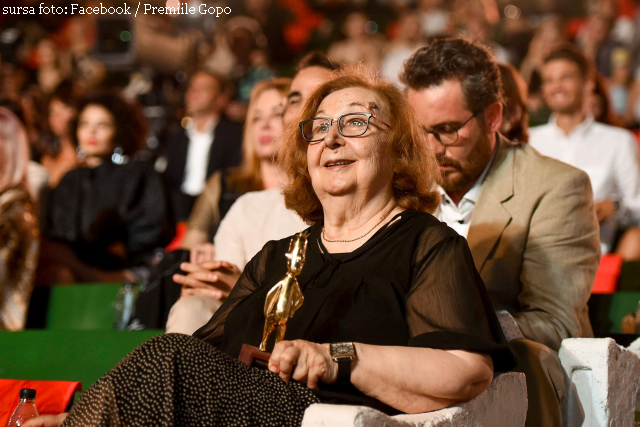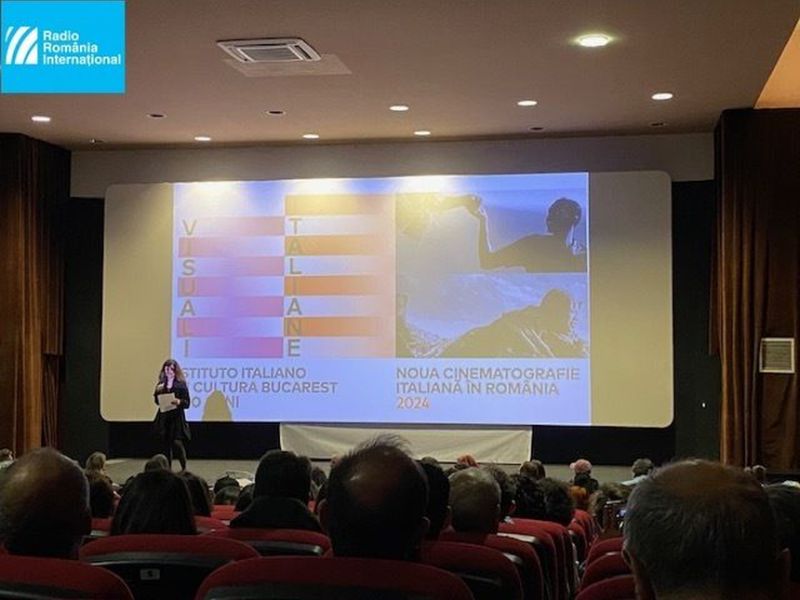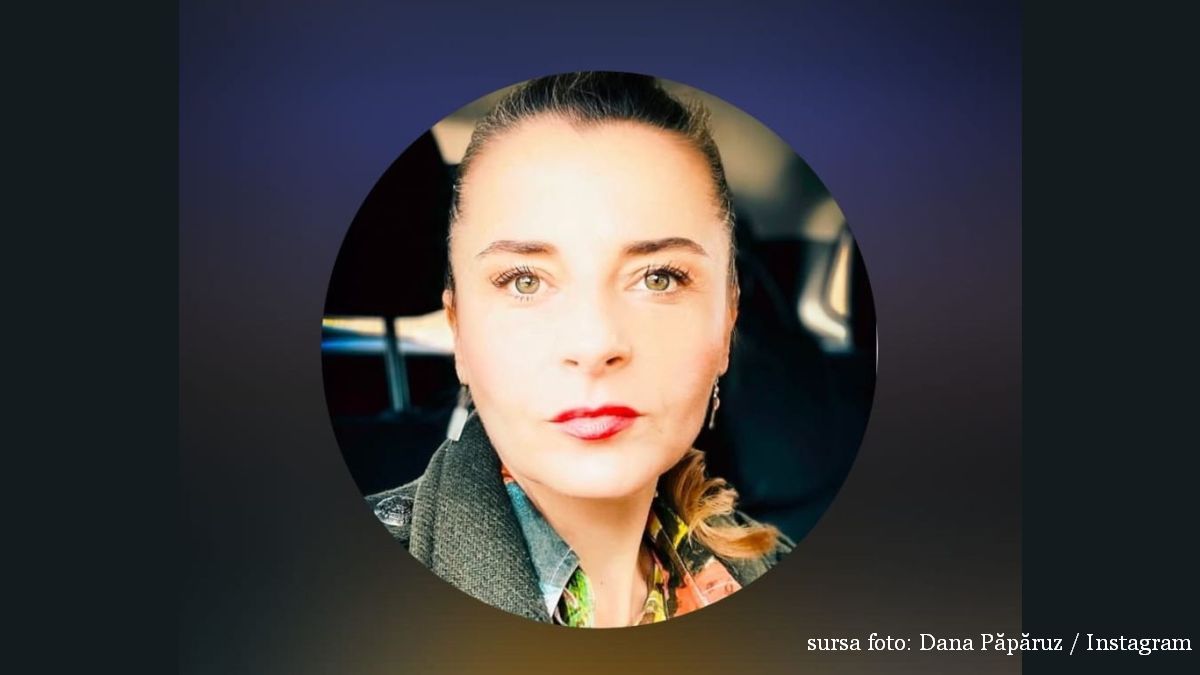Critic Magda Mihăilescu, winner of the Gopo Special Award
Magda Mihăilescu wins Special Award for her exceptional career in the world of film

Corina Sabău, 11.12.2021, 14:00
Film critic Magda Mihăilescu was honored at the 15th edition of the Gopo Awards Gala with the Special Award for her exceptional career in the world of film. A graduate of the Faculty of Philosophy, the Journalism Department of the University of Bucharest, she is a member of the Romanian Filmmakers Union and the International Federation of Film Critics (FIPRESCI). Magda Mihăilescu has been a film critic since 1964. She wrote the film reviews in Flacăra magazine, then in the newspaper Informația Bucureștiului, until 1982, when she was removed from the press. After 1990 she returned to the press and between 1991 and 2005 she wrote the film section of the newspaper Adevărul and the film page ‘Traveling of the magazine Adevărul Literar şi Artistic.
Between 2005 and 2008 she authored the film reviews of the newspaper Gândul. Since 2005 she has been a freelancer, publishing in the online newspaper DCNEWS, the online magazine of the Aarc Filmmakers Union and the Italian film magazine Otto e mezzo. She made her editorial debut in 1969, with the Sophia Loren monograph (Meridiane Publishing House), then she made studies in the history of cinema and wrote essays in collective volumes. She signed, together with another four European critics, the volume Guardare in faccia il male, Lucian Pintilie fra cinema e teatro (Italy, Pesaro, 2004).
She is the author of the books These Giocondas Without a Smile – Conversations with Malvina Urșianu (Curtea Veche Publishing House, 2006), François Truffaut – The Man Who Loved Movies (Curtea Veche Publishing House, 2009), My sister from Australia – Past meetings with Irina Petrescu (Union of Filmmakers Publishing House, 2019). She coordinated, together with Cristina Corciovescu, the volumes The Ten Best Romanian Films of All Time (Polirom Publishing House, 2010) and From Comrade Ceaușescu to Mr. Lăzărescu (Polirom Publishing House, 2011). In 2009, after the release of the volume about François Truffaut, the critic Alex Leo Șerban wrote in Dilema magazine: To my taste, Magda Mihailescu’s book, François Truffaut – The Man who Loved Movies, is the best book about movies ever written in Romanian.
We talked to Magda Mihăilescu about her passion for François Truffaut, which began with The Four Hundred Blows / Les quatre cents coups, which she saw shortly after the premiere: “François Truffaut shocked me, he marked me in a certain period. I was at the beginning of my career when I discovered him. I was impressed with the way he built his career. And I mean his career as cinema personality, not just as filmmaker, because Truffaut – as is well known – was involved in film criticism, he was one of the angriest French critics, who brought a new perspective in the evaluation of the French film. I was intrigued, seduced by this transition in his career, from the fussy, angry critic, from the one who buried the French cinema, as he was known at the time, to a demure critic, almost classic, but who subversively disturbed the waters of modernity. I was interested in how he built his career as a cinema personality, starting from the condition of critic and becoming the most important French filmmaker after the war. Whether we accept it or not, this is the truth. Maybe Jean-Luc Godard, to mention a much more spectacular character in the world of cinema, built a school. Truffaut did not build a school, but he remains the one and only Truffaut, many dream of reaching the end of that path which he reached. I was impressed by the complexity of his condition. Although I did not meet him – this was one of the paradoxes of my life, I met great filmmakers but not Truffaut – I learned from everything I read and heard from those around him that he was also very humane, that he was not only a charming, but also very generous person. Many young French filmmakers made their debut with financial support from Truffaut, but Truffaut never mentioned it. I was impressed by the complexity of this filmmaker and by the way he built his career.
Throughout her career, Magda Mihăilescu has conducted exclusive interviews for Romania with great film personalities such as Federico Fellini, Sophia Loren, Ennio Morricone, Andrzej Wajda, Orson Welles, Laurence Harvey, Marco Bellocchio, Claude Lelouch, André Téchiné, Fanny Ardant, Jean-Paul Belmondo, and Emir Kusturica.
Here is Magda Mihăilescu with details about the meeting with Federico Fellini: The meeting with Federico Fellini was a miracle. I was in Rome when he was filming Amarcord at the Cinecittà studio. And I can say that I was lucky enough to be quite young and resilient, because, when I got the approval to attend the filming sessions, I was told that no one could recommend me to Fellini. They said I could take a seat somewhere on the premises, as Fellini is filming day and night, and I was supposed to hang on as long as I could, and if Fellini noticed me, he was to come and talk to me. It was indeed a test of endurance and, after two days, Fellini approached me, he asked me what I was doing, why I was there. And that’s how I happened to be involved in this miracle of seeing Fellini at work. It’s hard to talk about it, but when I wrote the report after the filming, I did manage to put something on paper. It’s hard to talk about Fellini and portray him in words because he was playing all the time, he was playing on the set, with the extras, and with everyone who watched the shooting. He was filming a winter scene in the middle of summer, obviously with artificial snow, and he had come dressed in his coat, we were wearing summer clothes, as it was June. And he came to ask us how we could resist, why we were not cold. Unfortunately, I did not immediately enter his game, to pretend that I was cold, to understand that I realized that the reality invented by Fellini was stronger at that moment than the meteorological reality. This was Federico Fellini. He was said to be a sorcerer, and indeed he was a sorcerer. Watching him at work was probably the highest moment of my encounter with the miracle of the birth of cinema. (LS)





























